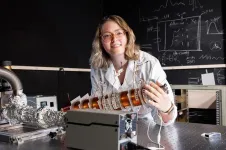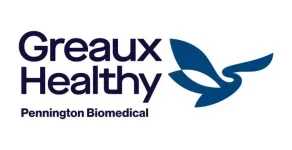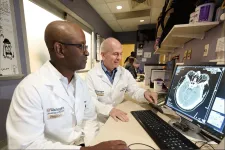(Press-News.org) A physics student at The University of Texas at Arlington studying ways to measure the mass of tiny particles called neutrinos has earned a prestigious national award for her research.
Senior Kara Stogsdill received the Outstanding Undergraduate Research Award from the Society of Physics Students, an organization of the American Institute of Physics. The award is given to students based on exceptional research achievements in any physics-related field.
Stogsdill’s research is part of the Project 8 Neutrino Mass Experiment, which includes faculty and students from UTA and 13 other universities and national laboratories in the United States and Europe. Project 8’s goal is to measure the mass of the neutrino, one of the building blocks of the universe. Ben Jones, UTA associate professor of physics and Stogsdill’s faculty mentor, is a principal investigator for Project 8.
Neutrinos are the most abundant particles with mass in the universe. Every time atomic nuclei come together (in the case of stars like the sun) or break apart (such as in nuclear reactors), neutrinos are produced. Even everyday items like bananas emit neutrinos from the natural radioactivity of potassium in the fruit. Scientists believe that studying neutrinos can help us understand how the universe came to contain matter.
In addition to having little mass, neutrinos also interact very weakly, making it difficult for scientists to pinpoint them to study. Stogsdill is building a Zeeman slower, an instrument that is used to slow and cool a beam of hot atoms so that scientists may study them more easily.
“Kara is an outstanding researcher who has made major contributions to UTA’s work for Project 8,” Dr. Jones said. “She has played a central role on our team, working with UTA scientists, undergraduates, and graduate students to realize a new method of cooling large fluxes of atoms to millikelvin temperatures. She has led development of the Zeeman slower system in collaboration with magnet system engineers at Pacific Northwest National Laboratory.”
Stogsdill, who grew up in Waco and attended Midway High School, said she developed an early fascination with physics as well as chemistry, mathematics, and science in general. She came to UTA initially planning to major in engineering.
“It wasn’t until I started talking to my physics professors that I realized that being a physicist was a very realistic career goal,” she said. “I asked my physics professor, Barry Spurlock, questions after class every day. Eventually he asked if I would like to see a lab, maybe get a job, and then he introduced me to Dr. Jones. I was brought down to see the lab, and I was hooked.”
Stogsdill said Jones has given her confidence to grow as an undergraduate researcher. She started out with no research experience and is now an experienced member of the lab group.
“As a mentor, Dr. Jones is infectiously and intensely fascinated with experimental particle physics and invested in my research project, but he is also very respectful and flexible when it comes to what I need as a student,” she said.
After graduating next spring, Stogsdill said she plans to apply for an internship at a national laboratory and then pursue a doctoral degree.
END
UTA undergraduate researcher receives national honors
Physics major recognized for neutrino research
2024-09-04
ELSE PRESS RELEASES FROM THIS DATE:
Pennington Biomedical's Greaux Healthy Initiative takes aim at childhood obesity
2024-09-04
Pennington Biomedical Research Center is formally launching Greaux Healthy, a public service initiative designed to help improve kids’ health at every age. Developed with funding from the State of Louisiana, Greaux Healthy implements 35 years of Pennington Biomedical research and discoveries to inform tools, resources and programing for children, parents, physicians and educators throughout the state.
The Greaux Healthy initiative is developing a wide variety of educational materials distinctly tailored to four priority populations, including expectant families and parents of infants, ...
Millions of people with diabetic foot ulcers could benefit from new research discovery
2024-09-04
Highlights:
Researchers from Michigan State University and South Shore Hospital in Massachusetts have uncovered a connection between two common diabetes drugs — insulin and metformin — identified in wound exudates of diabetic foot ulcers, which may improve their healing.
While analyzing wound exudate (the fluid the body moves and secretes to the site of an injury), researchers discovered the presence of metformin in patients who take the drug orally.
The researchers then explored metformin’s relationship ...
Adding anti-clotting drugs to stroke care ineffective, clinical trial finds
2024-09-04
Stroke patients who survive a blood clot in the brain’s blood vessels are prone to developing new blockages during their recovery periods, even if they receive vessel-clearing interventions. In an effort to avoid further clots, doctors at 57 sites around the U.S. tested a possible solution: the addition of anti-coagulant drugs to medicine that dissolves blood clots.
But results from the clinical trial, led by Opeolu Adeoye, MD, head of the Department of Emergency Medicine at Washington University School of Medicine in St. Louis, indicate two such drugs did not improve outcomes.
The findings are available Sept. 4 in The New England Journal ...
Research Center awarded $14.4 million to advance new manufacturing solutions for microelectronics
2024-09-04
A new Energy Frontier Research Center (EFRC), supported by the Department of Energy’s Office of Science and led by SLAC National Accelerator Laboratory, was awarded $14.4 million over four years to advance manufacturing of microelectronics by investigating approaches to building their components in fundamentally new ways.
Instead of moving electrons through conducting metallic interconnects in the miniscule and ever shrinking parts of devices such as microchips used in computers and cell phones, the researchers propose to move information via spin waves that can propagate through semiconductors ...
Notre Dame researchers create new tool to analyze embodied carbon in more than 1 million buildings in Chicago
2024-09-04
The built environment — which includes the construction and operation of buildings, highways, bridges and other infrastructure — is responsible for close to 40 percent of the global greenhouse gas emissions contributing to climate change.
While many building codes and benchmarks have focused on constructing “greener,” more energy-efficient new buildings, it is not enough to seek to reduce emissions in operations, said Ming Hu, the associate dean for research, scholarship and creative work in Notre Dame’s School of Architecture. Rather, policymakers and industry leaders ...
SMU researcher helps develop new technique to explore oceanic microbes
2024-09-04
DALLAS (SMU) – When SMU researcher Alexander Chase was a young boy, the sheer diversity of plants in Earth’s tropical rainforests fascinated him. He found himself wondering, what new species were out there, waiting to be unearthed? That curiosity is why Chase now collects samples from Earth’s oceans using a new technique called Small Molecule In situ Resin Capture (SMIRC), which could be the first step in uncovering compounds that lead to next-generation antibiotics.
Microbial natural products come from microorganisms, or microbes, and account for many of today’s essential medicines, including most antibiotics. Microbes are too small to see without ...
New guideline for Helicobacter pylori includes change to primary treatment recommendation
2024-09-04
The American Journal of Gastroenterology has published a new guideline on the treatment of Helicobacter pylori (H. pylori) infection.
The corresponding author on the guideline is William D. Chey, M.D., chief of the Division of Gastroenterology and Hepatology at Michigan.
H. pylori is a bacterium that infects over half the people in the world, though most are asymptomatic.
It can cause dyspepsia, peptic ulcer disease and gastric cancer.
This latest clinical practice guideline notes that its prevalence in North America is decreasing, but it still infects 30-40% of the population.
A previous guideline ...
Making desalination more efficient, by way of renewable energy
2024-09-04
(Santa Barbara, Calif.) — With freshwater becoming an ever scarcer resource, desalination of ocean water is increasingly employed to bridge the gap between supply and demand. However, desalination is energy-intensive, often powered by fossil fuels, so meeting the need for freshwater can exacerbate the challenge of reducing atmospheric CO2, the main driver of climate change.
Yangying Zhu, an assistant professor in the Department of Mechanical Engineering at UC Santa Barbara, wants to address that conundrum. Now, a two-year, $500,000 seed grant from the Advanced Research Projects Agency-Energy (ARPA-E) ...
Preventing car battery fires with help from machine learning
2024-09-04
One of the most critical safety concerns for electric vehicles is keeping their batteries cool, as temperature spikes can lead to dangerous consequences.
New research led by a University of Arizona doctoral student proposes a way to predict and prevent temperature spikes in the lithium-ion batteries commonly used to power such vehicles.
The paper "Advancing Battery Safety," led by College of Engineering doctoral student Basab Goswami, is published in the Journal of Power Sources.
With the support of $599,808 from the Department of Defense's Defense Established Program to Stimulate Competitive Research, Goswami and his adviser, aerospace ...
Heavy metal cadmium may be tied to memory issues for some
2024-09-04
MINNEAPOLIS – The heavy metal cadmium, which is found in the air, water, food and soil, is known to cause health problems. A new study published in the September 4, 2024, online issue of Neurology®, the medical journal of the American Academy of Neurology, examined if thinking and memory skills were associated with cadmium exposure. They found no association when they looked at the group as a whole. However, when looking at Black and white people separately, it found cadmium may be tied to problems with thinking and memory skills in white people. ...
LAST 30 PRESS RELEASES:
The wild can be ‘death trap’ for rescued animals
New research: Nighttime road traffic noise stresses the heart and blood vessels
Meningococcal B vaccination does not reduce gonorrhoea, trial results show
AAO-HNSF awarded grant to advance age-friendly care in otolaryngology through national initiative
Eight years running: Newsweek names Mayo Clinic ‘World’s Best Hospital’
Coffee waste turned into clean air solution: researchers develop sustainable catalyst to remove toxic hydrogen sulfide
Scientists uncover how engineered biochar and microbes work together to boost plant-based cleanup of cadmium-polluted soils
Engineered biochar could unlock more effective and scalable solutions for soil and water pollution
Differing immune responses in infants may explain increased severity of RSV over SARS-CoV-2
The invisible hand of climate change: How extreme heat dictates who is born
Surprising culprit leads to chronic rejection of transplanted lungs, hearts
Study explains how ketogenic diets prevent seizures
New approach to qualifying nuclear reactor components rolling out this year
U.S. medical care is improving, but cost and health differ depending on disease
AI challenges lithography and provides solutions
Can AI make society less selfish?
UC Irvine researchers expose critical security vulnerability in autonomous drones
Changes in smoking status and their associations with risk of Parkinson’s, death
In football players with repeated head impacts, inflammation related to brain changes
Being an early bird, getting more physical activity linked to lower risk of ALS
The Lancet: Single daily pill shows promise as replacement for complex, multi-tablet HIV treatment regimens
Single daily pill shows promise as replacement for complex, multi-tablet HIV treatment regimens
Black Americans face increasingly higher risk of gun homicide death than White Americans
Flagging claims about cancer treatment on social media as potentially false might help reduce spreading of misinformation, per online experiment with 1,051 US adults
Yawns in healthy fetuses might indicate mild distress
Conservation agriculture, including no-dig, crop-rotation and mulching methods, reduces water runoff and soil loss and boosts crop yield by as much as 122%, in Ethiopian trial
Tropical flowers are blooming weeks later than they used to through climate change
Risk of whale entanglement in fishing gear tied to size of cool-water habitat
Climate change could fragment habitat for monarch butterflies, disrupting mass migration
Neurosurgeons are really good at removing brain tumors, and they’re about to get even better
[Press-News.org] UTA undergraduate researcher receives national honorsPhysics major recognized for neutrino research






